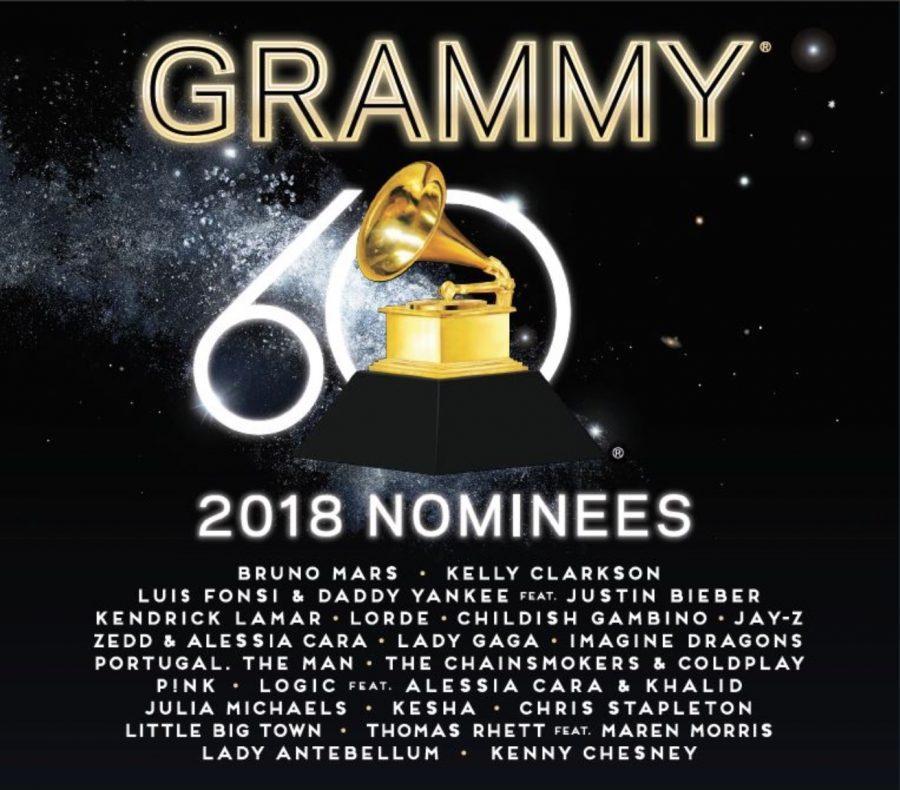Inclusivity at the 60th Grammys
The 2018 Grammy nominees are dominated by people of color, with artists like JAY-Z, Kendrick Lamar, Bruno Mars and SZA leading in most nominations.
January 18, 2018
The 60th Grammy Awards commence on Feb. 28 this year, and the nominations have been hailed as the most diverse in the ceremony’s history, with the two major categories, Album of the Year and Song of the Year being dominated by men of color.
This shift acknowledges the contributions of artists of color in the music industry.
“Urban culture is now pop culture,” the famous producer behind the works of hip-hop giants Jay-Z and Kanye West, No I.D said to the New York Times.
CAS sophomore Red Ama Ali praised the diversity of this year’s Grammy nominations.
“Black people created music and popular culture and we deserve to be awarded for it,” Ali said.
The Grammys’ choices for nominees are also receiving attention because of the controversies surrounding the Grammys and its lack of diversity in previous years.
In 2017, the Grammys came under fire for its decision to award Album of the Year to Adele’s “25,” which outsold every other album in 2016, rather than Beyoncé’s visual album “Lemonade,” which TIME magazine heralded as a cultural phenomenon and was acclaimed by critics. Those who opposed Adele’s win said the Grammys were not only behind with the times, sticking to the traditional album rather than the more experimental one that defined the year, but were too white and did not give proper praise to works by artists of color.
The Grammys were in hot water in 2016 for a similar reason. “1989” by Taylor Swift won Album of the Year over Kendrick Lamar’s critically acclaimed third studio album “To Pimp a Butterfly.” Several artists boycotted the Grammys, including neo-soul artist star Frank Ocean, who accused the award ceremony of cultural bias in an open letter on his personal Tumblr.
Even the Best Urban Contemporary Album award created in 2013 by the Grammys by an rhythm and blues producer of color so that black artists would be represented, has been criticized by some as a consolation prize for black artists whose work will not be honored with a Record or Album of the Year award.
“In attempting to create a black space on a predominantly white tableau, othering is a natural part of this construct,”music critic Brian Josephs of the Urban Contemporary category said.
The 2018 nominations seem refreshing and well-received, like the Grammys and its majority old, white male voters have finally listened to the cultural pulse. According to Nielsen Music, the R&B/Hip-Hop genre has dominated sales in 2017, with a lionshare of 24.5 percent of music consumption in the United States. The nomination of people of color in major categories acknowledges that artists’ of color talents are more than the Best Urban Contemporary category, they are also more than viable candidates for Album, Record and Song of the Year.
Ali, NYU’s Black Student Union political action chair said she hopes next year’s Grammy’s will expand upon its musical diversity.
“I do wish more black women were being nominated as well, but hopefully we will be next year,” Ali said.
A version of this article appeared in the Monday, Jan 22. print edition. Email Jendayi Omowale at [email protected].












































































































































